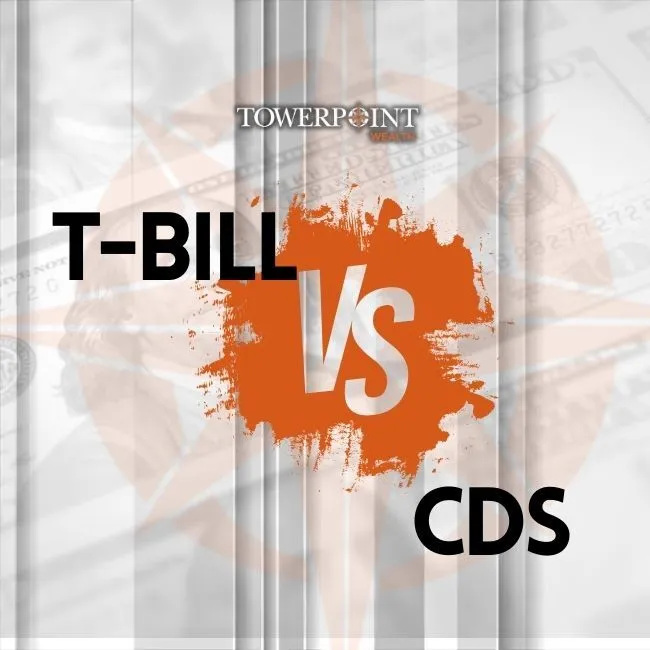Compare Treasury bill —T-bill— rates with bank CD best rates. T-bill rates today are often as competitive, and oftentimes more competitive, than the interest rates offered on CDs. But this is only one reason why, if you’re looking head-to-head at T-bills or CDs, Treasury Bills may be a superior safe investment.
Let’s look closely at T-bill yields and three other reasons why Treasury bills, short-term government bonds issued by the US Department of the Treasury, often emerge as the superior choice over Certificates of Deposit, or CDs.
Primarily, T-bills almost always carry virtually all of the benefits of CDs with a number of additional features and economic benefits, including tax benefits.
Taxes: Who wins, T-bills or CDs?
T-Bills Carry Tax Benefits
The interest income from T-bills, while still taxable at the federal level, is exempt from state and local taxes, presenting a notable advantage for investors in states with moderate-to-high state and local income taxes.
This state and local tax exemption enhances the after-tax yield of T-bills—the money you get to keep—and helps to contribute to more efficient returns on investment (ROI).
Conversely, the interest paid by CDs is fully taxable at the federal, state, AND local level, potentially reducing the net returns for investors. The tax-favored treatment of T-bill interest enhances their appeal as a tax-efficient investment, particularly for those seeking to optimize their returns while minimizing tax liabilities.
Liquidity: Who wins, T-bills or CDs?
T-Bills Have Exceptional Liquidity
Treasury bills are renowned for their exceptional liquidity in the financial markets. They are easily bought and sold, and offer distinct liquidity advantages over CDs.
As short-term bonds issued by the US Treasury, T-bills are actively traded in the secondary markets, enabling investors to easily buy or sell them—if they want—at prevailing market prices, even before their maturity.
This dynamic secondary market presence provides a high degree of liquidity, enabling investors to swiftly convert T-bills into cash without incurring significant transaction costs.
On the other hand, while CDs offer some liquidity, they often come with significant penalties for early withdrawals. T-bills carry no such penalties.
Safety and Risk: Who wins, T-bills or CDs?
T-Bills are Extremely Safe Investments
While we think of CDs as being the safest investment, Treasury bills hold a distinct advantage over certificates of deposit when considering safety and risk. T-bills are issued by the US Department of Treasury, and are backed by the full faith and credit of the US government. This government guarantee makes T-bills virtually risk-free, as, despite periodic political noise, the likelihood of US default is exceedingly low. This level of security provides investors with a safe haven for their capital, particularly during uncertain economic times. Conversely, CDs offered by banks are subject to the credit risk of the issuing bank, and as we know, it’s not unheard of for banks to fail.
T-Bills Have No FDIC Insurance Limits
With a bank CD, FDIC insurance limits are relatively low ($250,000 per depositor, per FDIC-insured bank, per ownership category), especially when compared to the limit-free US government insurance that T-bills provide.
Money earned: Who wins, T-bills or CDs?
T-Bill Yields are Often More Competitive
T-bill yields are often as competitive, and oftentimes more competitive, than the interest rates offered on CDs with comparable maturities, especially during periods of economic uncertainty or when interest rates are low. Take a look at T-bill rates today, compared with bank CD best rates, and see for yourself.
Though it might look like there is a clear-cut winner here, truth is, there are a lot of moving parts, and it’s important to consider all the elements involved. Before making any changes to your investment strategy, it’s a good idea to reach out to a certified, independent financial planner. One that is a fiduciary, that is—legally bound to act 100% in your best interests. All your life you’ve been working so hard for your money. It’s time to get THAT money to work for you.







